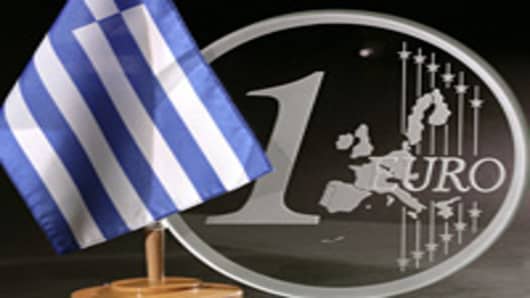Euro zone leaders face a new round of brinkmanship over Greece's €174bn bailout after international lenders failed to bridge differences on how to reduce Athens' burgeoning debt levels, pushing the country perilously close to defaulting on a €5bn debt payment due next week.
Officials had hoped to finalize the new program, which extends Greece's rescue two years to 2016, at a meeting of euro zone finance ministers in Brussels on Monday. That would free up a long-delayed €31.3bn aid payment desperately sought by Athens.
But according to officials involved in negotiations, international lenders remain far apart on how much debt relief for Greece is needed and who will bear the losses from lower debt repayments.
"It is absolutely clear that we will need another round after next Monday," said one senior euro zone official involved in the talks. "There are a number of issues that still need to be wrapped up."
(Read More: ECB's Draghi: Euro Zone Slowdown Hurting Germany)
Although negotiators insisted they are narrowing the differences, time may be running out. One senior official said the European Central Bank, which holds the €5bn in debt due next Friday, is resisting rolling the payment over, putting pressure on all sides to reach a deal quickly.
Officials said the International Monetary Fund and the European Commission, two of three members of the so-called "troika" responsible for managing Greece's bailout, are at odds over the size and the pace of Greece's debt reduction.
The IMF remains more pessimistic about Greece's ability to return to economic growth, the amount it will collect in its €50bn privatization program, and how much money is needed to recapitulates the country's teetering banking system.
As a result, Brussels and Washington are 5-10 percentage points apart on where Greece's debt will stand by 2020, the target date in the rescue program for returning Athens to sustainable debt levels.
Further complicating negotiations, officials said the IMF is insisting Greek debt levels are reduced to 120 per cent of gross domestic product by 2020, while the European Commission is urging an easing of the target to about 125 per cent by 2022.
One senior official said that if negotiators are forced to accept the IMF's stance, euro zone governments may have to take losses on their existing bailout loans, a politically explosive result that has already been rejected by Berlin and other northern euro zone countries fearful of backlash from their national parliaments.
Another negotiator said the European Commission was gradually moving towards the IMF position, meaning euro zone lenders will have to come up with even bigger amounts of debt relief than originally planned to get the program back on track.
(Read More: Greek Debt to Badly Miss Target: Euro Zone Official)
"There will be a need for measures that significantly reduce debt," said the negotiator. "Everybody has red lines out there."
Euro zone officials had hoped that debt relief measures could be limited to a cut in interest rates on bailout loans – from 150 basis points to 80 points above interbank rates – plus giving Greece the profits earned by the ECB on their €55bn in Greek debt holdings, estimated to be between €12bn-€15bn.
Mario Draghi, the ECB president, said on Thursday he had agreed to allow the profits to be passed back to Greece, but added he was unwilling to take further measures to help lower Athens' debt burden, putting additional pressure on euro zone governments to take the hit.
"The ECB is by and large done," Mr Draghi said.


